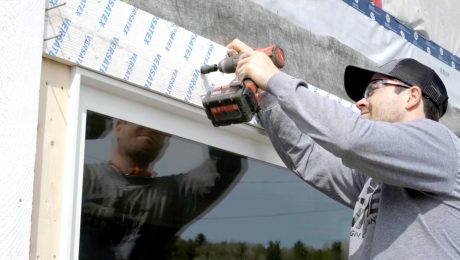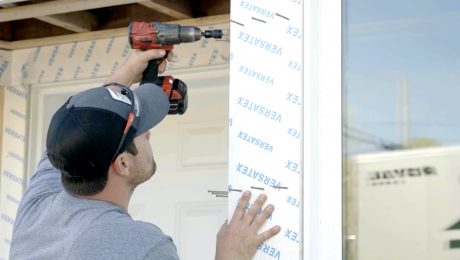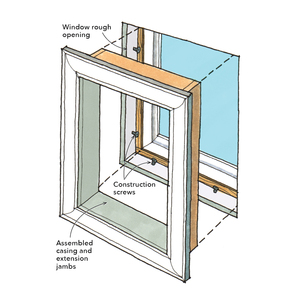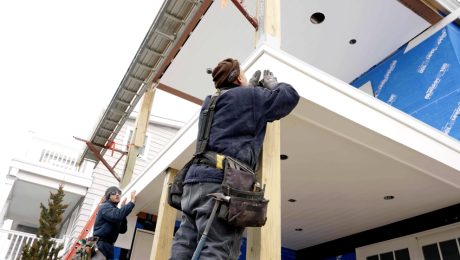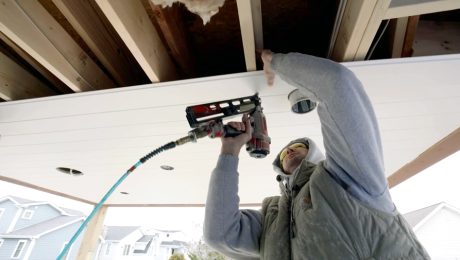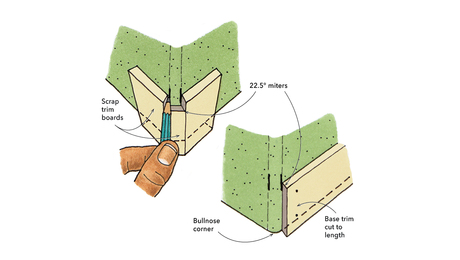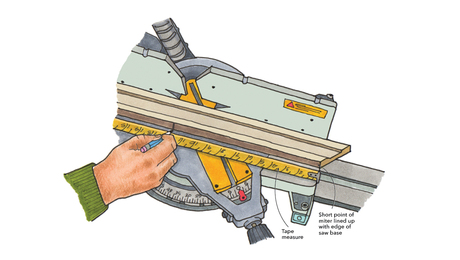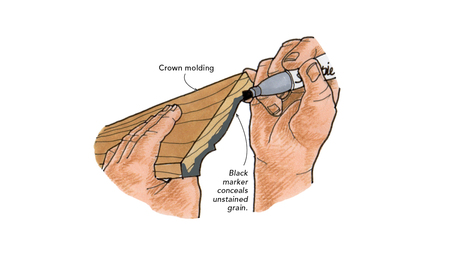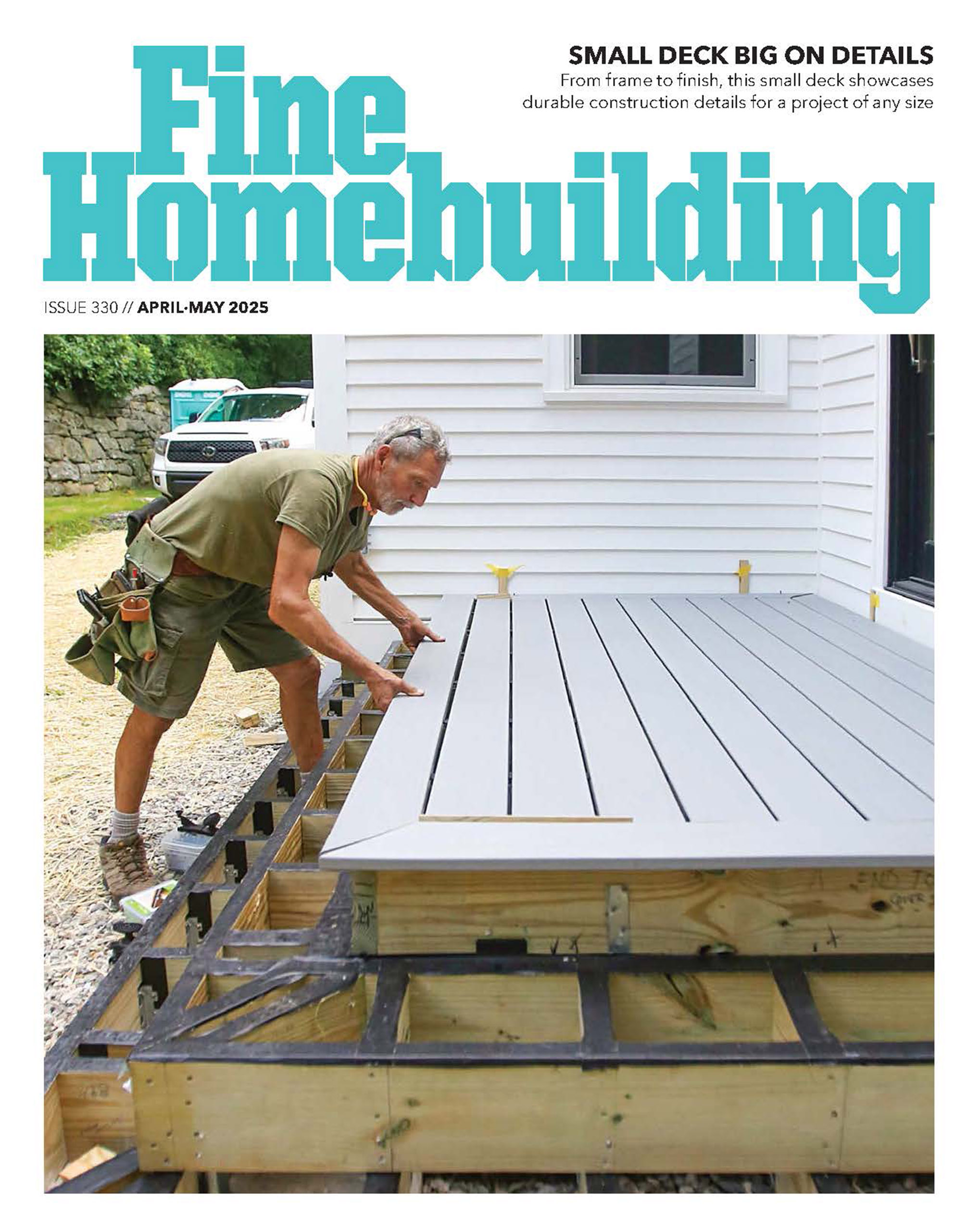Exterior PVC Trim: Weathertight Outside Corner
Lead carpenter Dan Booth details how to measure, fit, and glue up PVC trimboards for outside corners.
Sponsored by VERSATEX
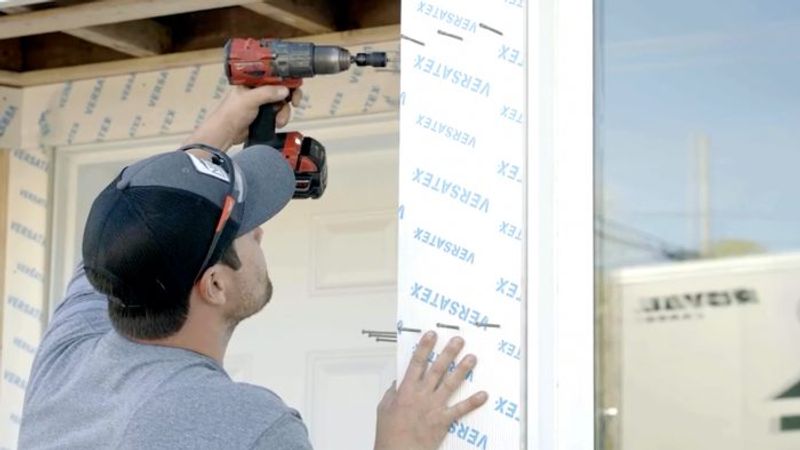
On this restoration, the entryway recedes into the building, creating an outside corner to either side. With such a close-up view, crafting a weathertight outside corner with a joint that won’t open is especially important. This can be a challenge when restoring an old building, since things aren’t always plumb and square, forcing a fair amount of cutting and fitting prior to any glue.
In this video, lead carpenter Dan Booth walks us through the process of measuring and fitting VERSATEX PVC trimboards before using the “tape method” to glue up weathertight outside corners.
Here’s the Transcript:
Today we’re in the Annapolis Valley in Nova Scotia, Canada, which is where I live. Behind me is a building that used to be a general store; however, I’m bringing it back to life for my own residential use. We’ve just finished our first outside corner here. As you can see, we’ve carried our top line across all of our windows. This is our benchmark that we’re working off. I’ve also kept a 1/8-in. reveal between the window and the trim for sealant, and then we’re going to cap this off with a historic sill that’s going to run the perimeter of the bottom of the windows. Before we get started installing any trim, I want to let you know what we’ve got going on here.
We’ve got our housewrap, that’s our WRB, and we’ve flashed all of our windows prior to installing our 1×4 strapping that’s going to act as a rainscreen. I packed these corners out solid so that we ensure we have solid backing in behind our trim. Next up, we’re going to do the other outside corner behind me, and I’m going to walk you through how I got this outside corner so tight so that it doesn’t open up. This is super important because not only do we deal with warm sunny days, but we also deal with some extreme harsh cold conditions. Let’s get going.
When you’re dealing with a corner that has a taper on it, due to this corner not being plumb, I take my measurements at my top and my bottom. This piece of trim is going to end at the bottom of the window for a sill to wrap around. I just take my measurement here and at the top and then I lay that out on my piece, line it up with my track saw, and make the cut.
When dealing with irregular outside corner angles, I overcut it by half a degree. This ensures that I’m going to have contact on this leading edge, which is going to be the most exposed, maintaining that weatherproof joint. I want to make sure I’m maintaining my 1/8-in. gap along the window and the trim. Here I have to make a minor adjustment and recut this top so that I get a nice tight fit here. As you can see, this joint is a little open on this end and I’m tight here. The main thing is just to ensure that you get your pieces fitting correctly. I always like to leave my piece long. That way I can make a couple of adjustments without sacrificing the piece potentially. That looks great to me, so we can mark it and cut it to length. Here I’m just marking the bottom. I want to make sure I leave my pencil mark there so I can maintain our 1/8-in. gap below our window.
Now that I’m happy with the fit of this piece, sometimes it can get confusing, which is the top and the bottom of the piece, especially when you’re dealing with pieces that are tapered. I’m just going to mark my left side and mark my top and my bottom. That way when I glue it up, I know it’s the right direction. We lucked out here. This piece is consistent with the entire length of the piece. I’m just going to repeat the same process as the other side, ensuring that I have a nice tight fit across the top, which it looks like I do already. That means I can just mark the bottom and cut this piece to length. Now that I’m happy with how this is fitting, I can take it over to our assembly table, glue it up, and install it.
Anytime you’re getting ready to do any sort of glue up or assembly, it’s nice to have a good clean workspace, making sure that none of that ends up in my glue joint. This is when labeling your pieces is very important. As you can see here, I’ve got my left piece on my left side. This just ensures when you go to glue it up, you’re not going to have any issues when you go to install. I’m just lining up the ends of my piece before I start taping this off. This is going to ensure when I glue it that everything is where it needs to be. Once I’ve got these lined up, I just place a couple of pieces along the joint to start ensuring that these are lining up together. I can bring them together if there’s a small gap and work my way to the end of the piece.
This is another benefit to this protective film on VERSATEX. It not only ensures that you’re going to get good contact on your tape, but it makes sure that if there was any residue from this tape, it’s going to come off on the film and not be stuck to your finished piece. Now that I’ve got these small pieces holding it in place, I’m going to come back over top with a full strip from top to bottom. This is just going to hold my miter or my corner exactly where I need it to be when I go to do the glue-up. It’s important to be careful when you’re flipping these not to have the tape pull away, and you can just double-check that you’ve got a nice consistent gap between your two pieces and then you’re ready for glue. Here we’re just using a PVC glue, and this is a glue that’s recommended by VERSATEX for this application. You want to make sure you have a good even coverage, so I like to come back with a paintbrush and make sure I’m just getting all the edges.
I’m going to start with the back end of our joint, and then I’m going to work my way toward the tip. You can reapply glue as needed. This is definitely a place you do not want to skimp out on. We’re going to be relying solely on this glue to maintain our weathertight joint throughout the seasonal changes. So ensuring you have adequate glue coverage here is key. I’m just going to come back and do one last pass to make sure I’ve got adequate glue on this joint. You want to make sure you get glue right out to the tip of this—the long point of this miter—as that’s what you’re going to see when this is installed. Once you’re happy with the glue coverage, you can start to clamp this together using tape. I’m just going to start a few pieces on the backside here. Now once I’ve got my tape in place, I’m going to fold this up and close this joint.
You want to ensure that when you rip your tape, you’ve got enough material that you can reach across these two pieces to hold them in place. You’ve got a little bit of time to finesse this joint and move it where you want it to be before the glue starts to set up. Now I’m just checking on the backside and making sure that I’m getting this—the backside of my miter—as tight as I can and that I don’t have one piece above or below the other. Now if I do, like you can see here at the end, the piece that’s closer to me is just a little bit lower than the piece that’s resting on the table. All I’m going to do is use a little CA glue in the backside of this joint. Then I’m going to hit it with the activator and hold my two pieces exactly where I want them to be. This sets up in about 10 or 15 seconds, and that’ll hold it in place until the PVC glue dries.
Another thing I like to do is just periodically put a little bit more CA glue on the back of this joint and hit it with the activator. This is just going to keep the pieces in place until the PVC glue sets up. Now that we’ve waited 30 minutes for the glue to set up, we can take our tape off and see how we did. Now that the glue is set up, this should be a very strong bond, so we don’t have to be too gentle with it. But if you’re going to handle it any earlier than 30 minutes after applying the glue, definitely handle it with some care. Now here’s where you want to be a little careful just taking the tape off. One of the great benefits to having this tape run down the seam is that it helps reduce the amount of squeeze out from the glue. And again, the VERSATEX protective film protects the piece from getting any extra glue on the surface of the workpiece. It looks like we’ve got a great, nice weathertight joint and that everything went well.
Now I’m just going to take it over and test-fit our piece. Before installing the fasteners. I like to get the screws started so that way when I put the board up in place, I can just send the screws right in. The next step is I’m going to apply some PVC glue on the top edge of the piece here. This is going to help it bond to our header piece above. You want to only apply the glue to one piece, not both pieces like you might think. Rather than being a traditional glue, this chemically bonds the two pieces of PVC together. In order to maintain the 1/8-in. gap between window and trim, I can manipulate the corner board with the screws. If I need to get my board closer to this window on my left side, I simply screw one of the screws on my right board. The same goes for the other direction.
I’m checking to see which side has a larger gap. Since I have a larger gap on this side, I’m going to install one of these screws on the left-hand side. This is going to draw my piece over tighter to my window, closing this gap ever so slightly.
RELATED STORIES
